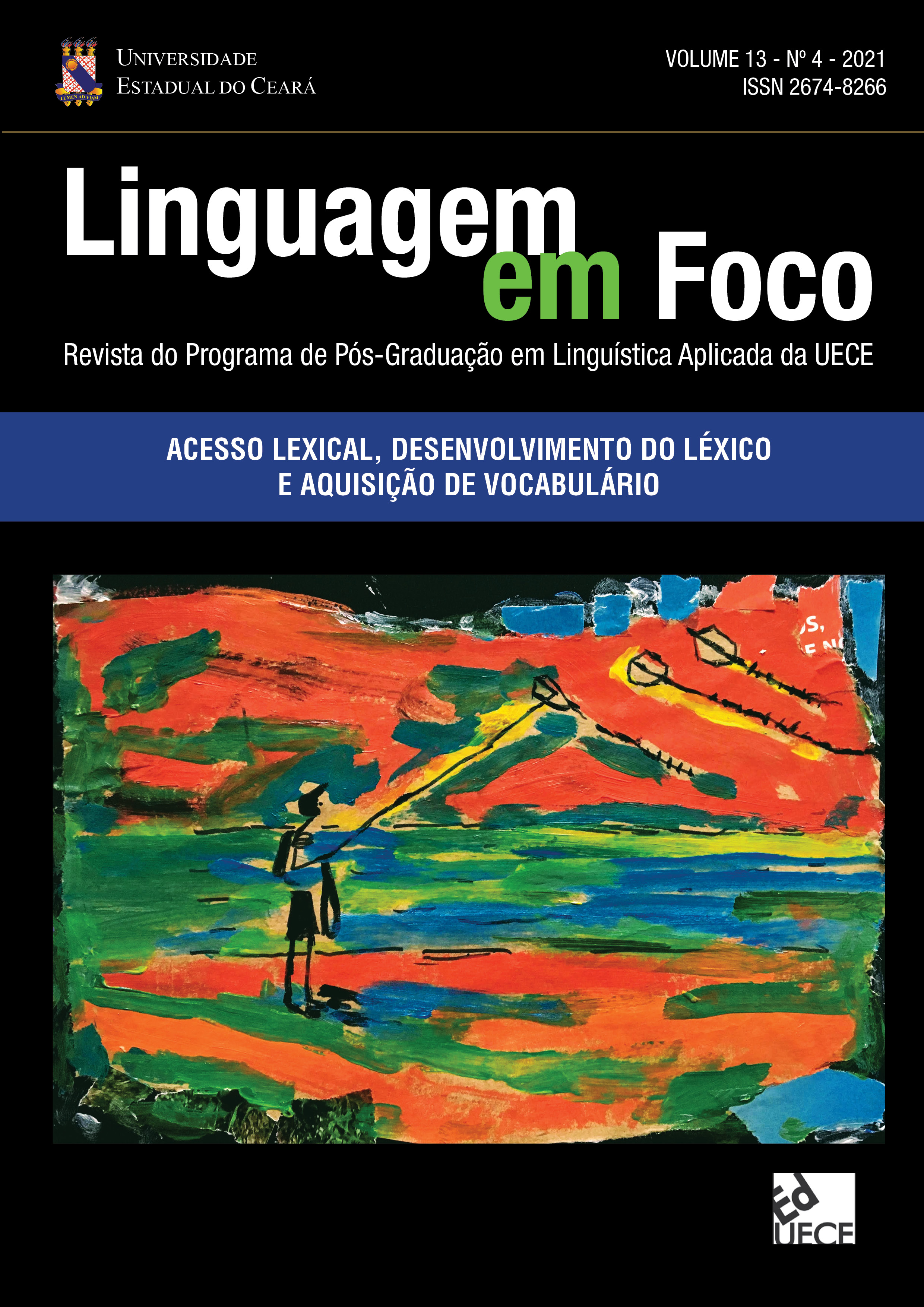Spelling-sound knowledge in the context of multilingualism
Is lexical access selective or nonselective?
DOI:
https://doi.org/10.46230/2674-8266-13-7387Keywords:
Writing Systems, Lexical Access, Multilingualism, Phonological PrimingAbstract
The present study investigates shared phonological information and selectivity during lexical access in Brazilian Portuguese-English unbalanced bilinguals, learners of Korean as an L3. Participants took part in a word naming task which used L2 primes with targets from the L3 at stimulus onset asynchronies (SOA) of 140ms and 250ms. The results show a significant facilitation effect in word naming when an English prime was presented in comparison with control primes. Additionally, a significant facilitation effect was also seen in trials in which the primes were presented at a 250ms SOA in relation to a 140ms SOA. Taken together, the results indicate that participants’ spelling-sound knowledge of L2 English was activated during the reading aloud of words in L3 Korean, which indicates nonselectivity in lexical access and a shared mental lexicon across languages.
Downloads
References
BATES, D. et al. Fitting Linear Mixed-Effects Models Using lme4. Journal of Statistical Software, v. 67, n. 1, 2015.
CHOI, W.; NAM, K.; LEE, C. H. Nonselective Access of Phonological Lexicon for Two Different Orthographies: Korean and English. Perceptual and Motor Skills, v. 110, n. 3, p. 693–698, jun. 2010.
DIJKSTRA, T.; GRAINGER, J.; VAN HEUVEN, W. J. B. Recognition of Cognates and Interlingual Homographs: The Neglected Role of Phonology. Journal of Memory and Language, v. 41, n. 4, p. 496–518, nov. 1999.
DIJKSTRA, T.; VAN HEUVEN, W. J. B. The architecture of the bilingual word recognition system: From identification to decision. Bilingualism: Language and Cognition, v. 5, n. 3, p. 175–197, dez. 2002.
GRAINGER, J.; DIJKSTRA, T. On the Representation and Use of Language Information in Bilinguals. In: HARRIS, R. J. (Ed.). Cognitive Processing in Bilinguals. Advances in Psychology. North-Holland, 1992. v. 83, p. 207–220.
JOURAVLEV, O.; LUPKER, S. J.; JARED, D. Cross-language phonological activation: Evidence from masked onset priming and ERPs. Brain and Language, v. 134, p. 11–22, jul. 2014.
LEE, C. H.; NAM, K.; KATZ, L. Nonselective access of spelling–sound knowledge for Korean‐English bilinguals. International Journal of Psychology, v. 40, n. 6, p. 407–415, dez. 2005.
NAKAYAMA, M. et al. Cross-script phonological priming for Japanese-English bilinguals: Evidence for integrated phonological representations. Language and Cognitive Processes, v. 27, n. 10, p. 1563–1583, dez. 2012.
POLLATSEK, A. The Role of Sound in Silent Reading. In: The Oxford Handbook of Reading. 2015.
ROUX, F.; ARMSTRONG, B. C.; CARREIRAS, M. Chronset: An automated tool for detecting speech onset. Behavior Research Methods, v. 49, n. 5, p. 1864–1881, out. 2017.
SZUBKO-SITAREK, W. Multilingual Lexical Recognition in the Mental Lexicon of Third Language Users. Berlin, Heidelberg: Springer Berlin Heidelberg, 2015.
TOASSI, P. F. P. Investigating Lexical Access in Multilinguals: A Study on the Processing of English as L3. Tese (doutorado) - Universidade Federal de Santa Catarina, Centro de Comunicação e Expressão, Programa de Pós-Graduação em Inglês: Estudos Linguísticos e Literários, Florianópolis, 2016. Disponível em: https://repositorio.ufsc.br/xmlui/handle/123456789/171451. Acesso em: 04 mar. 2022.
TOASSI, P. F. P.; MOTA, M. B. Acesso lexical de bilíngues e multilíngues. Acta Scientiarum. Language and Culture, v. 37, n. 4, p. 393, 1 out. 2015.
VAN HEUVEN, W. J. B.; DIJKSTRA, T.; GRAINGER, J. Orthographic Neighborhood Effects in Bilingual Word Recognition. Journal of Memory and Language, v. 39, n. 3, p. 458–483, out. 1998.
Published
How to Cite
Issue
Section
License
Copyright (c) 2022 Luiza de Melo Carvalho, Mailce Borges Mota, Pietra Cassol Rigatti

This work is licensed under a Creative Commons Attribution 4.0 International License.
Authors who publish in Linguagem em Foco Scientific Journal agree to the following terms:
- Authors retain the copyright and grant the journal the right of first publication. The articles are simultaneously licensed under the Creative Commons Attribution License which allows sharing the work with an acknowledgement of its authorship and initial publication in this journal.
- The concepts issued in signed articles are the absolute and exclusive responsibility of their authors. Therefore, we request a Statement of Copyright, which must be submitted with the manuscript as a Supplementary Document.
- Authors are authorized to make the version of the text published in Linguagem em Foco Scientific Journal available in institutional repositories or other academic work distribution platforms (ex. ResearchGate, Academia.edu).





























